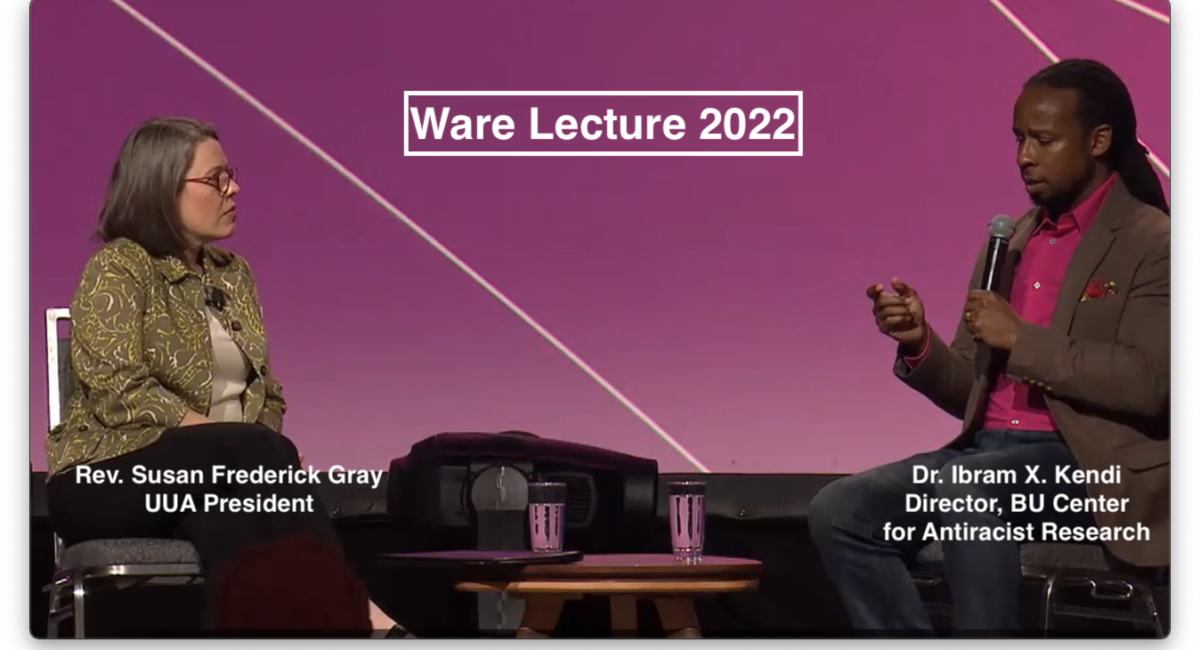January 29, 2023
The Unitarian Universalist Congregation of Somerset Hills
Somerville, NJ
part of our annual NJ UU pulpit swap
Reverend Karen G. Johnston
The Ware Lecture is an annual lecture, sponsored by the UUA, that has been happening since 1922 – last year’s lecture marked 100 years and nearly as many actual lectures. Lectures by individuals including yes, Rev. Dr. Martin Luther King and Dr. Helen Caldicott and Karen Armstrong and Van Jones and Mary Oliver and Norman Lear and Marian Wright Edelman and Kurt Vonnegut Jr and Shirley Chisholm and Saul Alinsky, and Jane Addams and… you get the picture.
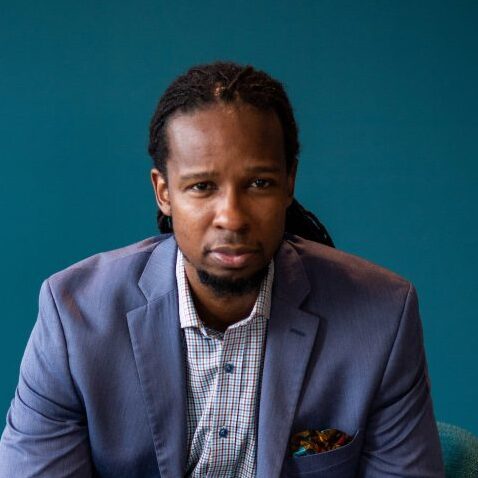
This past year, the Ware Lecturer was Dr. Ibram X. Kendi, author of Stamped from the Beginning and How to be an Anti-Racist (which our anti-racism book group has read). He’s the director of the Boston University Center for Antiracist Research. And rather than a lecture format, this year it was a conversation with the president of the UUA, Rev. Susan Frederick Gray.
Early in the exchange, Dr. Kendi begins to tell what is clearly a story he has told before. He even says that he writes about it in his book, Stamped from the Beginning. The story he tells is an example of his understanding that it is not ignorance, lack of education, or even lack of exposure that feeds racist actions – it is racist ideology that feeds racist behavior.
Let me say that again to be sure you are with me, because it’s the opposite of how many liberal people in the United States think about racism. It is not ignorance or lack of education that leads to racist behaviors. It is systems of domination, shaped along racial lines, that instigate, support, and sustain racist behaviors.
The implications are important because this means that educating someone, or increasing their exposure to other cultures or communities, is insufficient to dismantling racism as a system of oppression.
Just like having body cams on police officers and providing diversity training is tragically insufficient.
Dr. Kendi grounds this understanding in his own research, as well as in the research of others. This is the story he told in the beginning of the Ware Lecture:
Using the 1840 census, a Harvard-trained psychiatrist named Edward Jarvis looked at the state of what was then called “insanity” in the United States. Ultimately he learned that Blacks in the North were ten times more likely to be labeled insane than in the South. Jarvis wrote up his findings which were published in a highly respected and highly read journal. And his supposition? Freedom made Black people insane.
Ouch. Big OUCH.
Now John C. Calhoun from South Carolina was one of the leading thinkers on the pro-slavery side of things. He and his ilk glommed onto this article and this theory and ran with it. They had already been saying that slavery was good for Blacks because it civilized them. Now they had a “proof” that freedom was bad for them. And this became the primary philosophical argument for slavery for the next quarter century.
Here’s the thing, though: Jarvis didn’t look at his data once and be done with it. He stayed with the data and noticed fundamental problems with it. Such as, in multiple places in the census data, there were more Blacks who were insane than there were residents.
That’s not possible.
Jarvis wrote a correction to his article, which was published. Yet those in the pro-slavery camp did not pay attention. Buoyed by their ideology, they selectively tended to the research of their day, despite being corrupt and rescinded. They continued, their ideology being consumed by Southern whites because it confirmed the system which upheld their economic and social privileges.
John C Calhoun (not only a thought leader of his time, but also Vice President!) was from South Carolina. The same state from whence hailed the man who viciously beat Massachusetts Senator, Charles Sumner, on the floor of the Senate because Sumner, an Abolitionist, had said of another South Carolina politician that he had taken up a mistress: the harlot called Slavery. That was 1856, more than a decade after the Jarvis article was published, but still a part of the same philosophical, pre-civil war period.
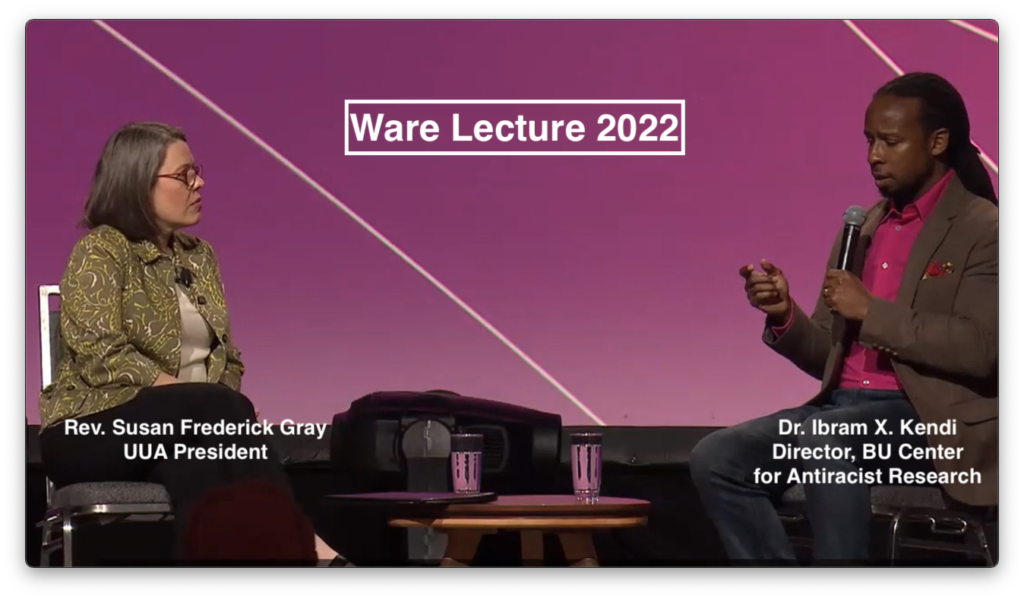
I mention Sumner along with Calhoun and Jarvis because during the Ware Lecture – really, the Ware conversation – Rev. Frederick Gray responds to Dr. Kendi’s story of Calhoun by mentioning Sumner. Rev. Susan says, more or less, there’s a “funny thing” – because not only was Abolitionist Senator Charles Sumner a Unitarian, but so was the pro-slavery Calhoun. Rev. Susan’s point being: we Unitarian Universalists have a history of being on both sides this racism thing. But it doesn’t end there. And then, unexpectedly from the audience, one of the historian-ministers (Rev. Meg Richardson) shouts, “So was Jarvis!”
How did Rev. Susan respond? With poise, as ever. She took in this new information, thanked the source, and then acknowledged: yes, all three of these white men – John C Calhoun, Charles Sumner, and Edward Jarvis – were Unitarian. Then she claimed them: “This is our family. This is our kin.”
If we are going to change our karma, the first step is beholding reality as it is, not turning away.
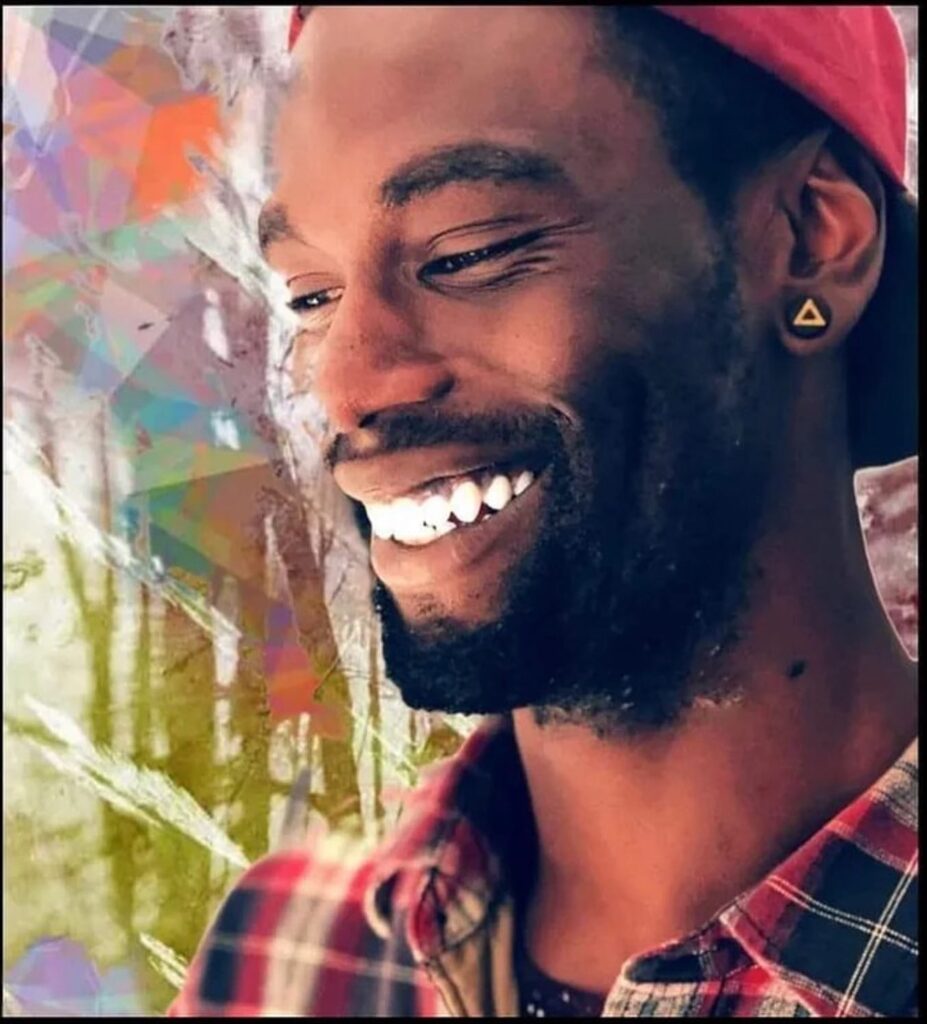
Karma is far more complex than the simple explanation that “whatever you put into the world you get back” which is one of the explanations you will find with an internet search or at too many yoga studios.
Just like it turns out that racialized police brutality is far more complex when we see an unarmed Black man is beaten to death at a traffic stop by five Black police officers.
When we take the concept of karma seriously, we understand that it is an attempt to explain how and why things happen, recognizing that actions in the past influence the present and future. Think of versions of this concept from the likes of Faulkner, and Baldwin, and Obama: the past is never dead. It is not even past.
Given what has happened earlier this month in Memphis, with the brutal murder of Tyre Nichols; given what has been happening for year upon year, decade upon decade, century upon century, we cannot avoid the truth that the past is not past. We cannot escape the lamenting fathers and the wailing mothers.
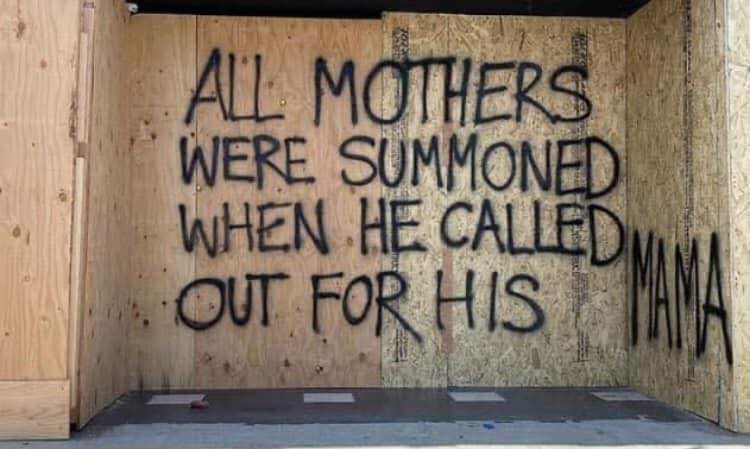
We cannot turn away from the summoning of all mothers when Mr. Nichols called out in his dying breath for his mother. Just like George Floyd. Just so many others. Too many others.
It seems obvious: our racial future is connected to our racial past and our racial present, yet not all Americans are willing to live into this truth and its consequences. Yet this is necessary, this reckoning, if we are to accomplish anything like healing, if we are to get closer to something that looks like, sounds like, feels like Beloved Community.
As Dr. Larry Ward, who wrote this morning’s opening words, writes in his book, America’s Racial Karma: An Invitation to Heal:
There is no America without racial karma. You cannot understand this place without knowing the history of economic power in the United States and how it was abused. You cannot begin to heal this place if you don’t understand that. By this place, I mean this place that is America in you and America in me.
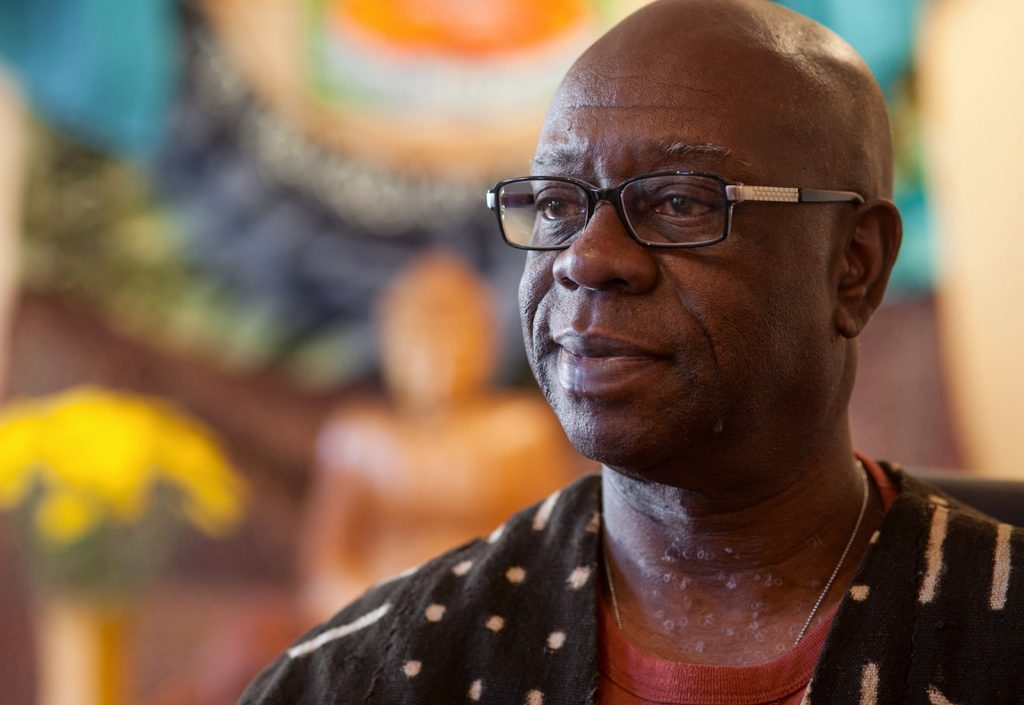
Here we all are, existing within an interdependent web of actions that inform our individual and collective choices. Here we all are with the capacity to shift, change, and even transform the future.
Yes, when it came to slavery, Unitarians (and Universalists) were on all sides: yes, the Abolitionist Charles Sumner and also, the slavery ideologue, John C Calhoun. And it’s not just a binary choice: Edward Jarvis is ours to claim as well: causing damage, then trying to repair the harm.
All this is our history. All this is our past that is not past. All this is our karma.
Yes, when it comes to police reform and police abolition, likely even police status quo, Unitarian Universalists are on all sides. Though, for those of us not fully on the abolition side, the stark reality of brutality like the murder of Tyre Nichols, it is hard, at least for me in this moment, to get with the apologist arguments. My lamenting heart cannot bear another “bad apple” (or five bad apples) defense.
How is healing the whole of America possible when we continue to allow such violence to fester and bloom, allow such sickness to sicken the rest of the American body, this body that is our body, to many Black and Brown bodies, our beloved collective body, our Beloved Community?
It is my understanding that the mother of Tyre Nichols, RowVaughn Wells, insisted on the video of her son’s murder made public – much like Mamie Till-Mobley demanded of America when she held an open casket funeral for her tortured and murdered son, Emmet in 1955. It is hard not to see karmic echoes in this. And as hard as it is, this is a necessary part of what healing looks like, whether or not you choose to view the footage.
There is hope in a Buddhist understanding karma. There is hope in a Buddhist understanding of how and why things happen. For we are not just doomed to repeat the past.
The hope to be found is that we can affect change now and change the pattern going forward. We do so by which seeds of potentiality we water and which ones we allow to go dormant.
We have watered the seeds of white supremacy – we continue to water the seed of white supremacy – creating untold damage. Stealing the lives of untold numbers, including Mr. Nichols.
Yet the seeds of freedom, of equity, of a resilient love for diversity, a robust longing for justice – these seeds are there, too. We can water these seeds. We have been watering these seeds. We will continue to water these seeds and do what is ours to get more and more Americans to do the same: water the seeds of justice, of accountability, of collective liberation, of Beloved Community.
Yes, we can be like Charles Sumner, hopefully not beaten by a violent white supremacist on the floor of the Senate, but using our power to call out racist systems of oppression, because we have that same karmic seed within us.
We can be like Edward Jarvis: recognizing the mistakes we have made, making amends, seeking to repair the harm that came from our actions, because we have that karmic seed within us, too.
And yes, because we Unitarian Universalists have the karmic seed of Calhoun in us, we can find ourselves using our ideologies to rationalize privilege and doing whatever it takes to maintain our own comfort, for this karmic seed is within us as well. We can see this in action within our faith movement even now. We cannot allow it to be watered.
As our closing hymn tells us, it is in our response that we shall be known – known by the company we keep and as we sow and reap the seeds of change from deep within the earth. And I would say, deep within ourselves.
Dr. Ward writes:
This moment in our social history compels us to invite ourselves into a path of discoveries, learning, and practices to transform our karma.
Let us hear that invitation in our opening hymn that someone is calling our name, sounding like justice.
Let us hear that invitation in Mr. Nichols’ dying moans for his mom, even has it breaks our hearts, and more importantly, leaving her heart-broken.
Let us hear that invitation in each other as we move toward healing America’s racial karma and thriving in Beloved Community together.
So be it. See to it. Amen.
